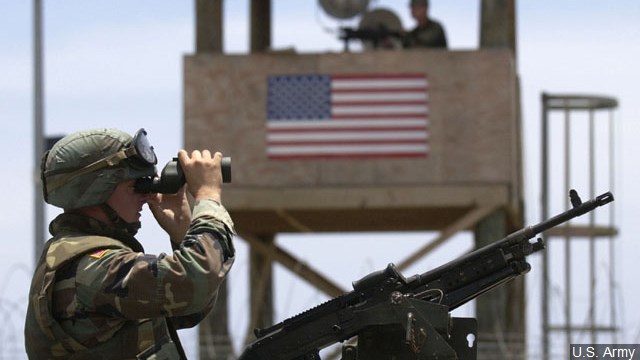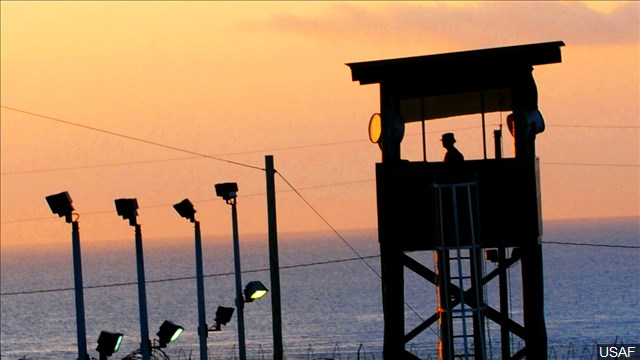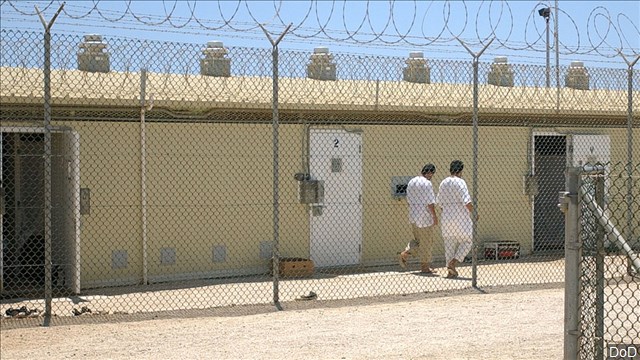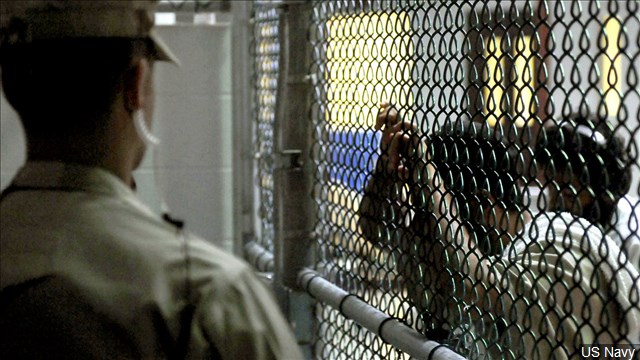WASHINGTON—Twenty years after the first detainees arrived at Guantánamo Bay Detention Center in Cuba, the United States is still holding 40 detainees, indefinitely, most without charge and none having received a fair trial.
“After 9/11 happened, I was kidnapped from Mauritania to Jordan, from there to Afghanistan and from there to Guantanamo Bay where I was tortured,” Mohamedou Ould Slahi told the virtual audience at the Rights or Rightlessness Event, to commemorate the 20thAnniversary of the first detainees arriving at Guantanamo Bay.
“I stayed there for 15 years and was released in 2016. I was never convicted or charged with any crimes,” he said. “Muslim dictators rounded up so many young men just because of suspicion. I understand suspicion but I don’t understand kidnap and torture. The U.S. twisted the arms of the leaders of so many countries, but we expected better from the U.S.,” he continued.
The Jan. 11 event was sponsored by the Center for Constitutional Rights, Justice for Muslims Collective, Witness Against Torture, and Amnesty International USA.
“I appeal to President Biden to close Guantanamo Bay. It doesn’t belong in a democracy that is ruled by law. I got to meet other American citizens and they don’t want Guantanamo Bay either. They want the same as people in Egypt and Senegal—respect for human rights, not torture,” said Mr. Slahi.

There is a great expectation that the incoming Biden-Harris administration may do something to close Guantanamo Bay. President Biden becomes the fourth incumbent to preside over the prison.
In 2009, then-Vice President Joe Biden told the audience at the Munich Security Conference, “We will uphold the rights of those who we bring to justice. And we will close the detention facility at Guantanamo Bay.”
He is now the man in charge to do that. The detention center still holds five of the men accused of planning the September 11, 2001 attacks but they have yet to receive a trial.
“This facility exists as a site to house Muslim men exclusively. The prison opening in 2002 seems like a long time ago but it’s important that we know how it started,” said Dr. Maha Hilal, co-director of Justice for Muslims Collective at the virtual event.
“It was during the brutal (George W.) Bush regime that in 2006 President Bush said these men will be held in a high security facility and will be treated with the humanity that they denied others. One can hardly imagine Guantanamo, the site of water boarding, forced feeding, sleep deprivation, and stress positions as illustrative of humane treatment,” said Dr. Hilal.

“Whether under Bush, Obama or Trump, the rest of the world has come to see Guantánamo Bay as one of the war on terror’s earliest and notorious relics, precisely because of the brutality inflicted on the prisoners behind the walls. Guantanamo exists as one of the most visible and symbolic sites of institutionalized Islamophobia.”
Amnesty International released a new report Jan. 11, that highlighted historic and continuing human rights violations at Guantánamo Bay.
“This is about more than just the 40 people still held at Guantánamo—it is also about the crimes under international law committed over the past 19 years and the continuing lack of accountability for them. It is about the future, too, as we move towards the 20th anniversary of the 9/11 attacks and strive for enduring justice,” said Daphne Eviatar, director of the Security with Human Rights Program at Amnesty International USA.
The report documents a catalogue of human rights violations perpetrated against those detained at the camp, where victims of torture are held with inadequate medical care indefinitely and in the absence of fair trials. Transfers out of the facility have stalled, and even those cleared for release have remained incarcerated for years on end.
The U.S. decided to frame its response to the 9/11 attacks as a “global war on terror.” It ignored human rights protections in the pursuit of intelligence gathering. The report explains how America committed crimes under international law such as torture and kidnappings.
The detainees were deliberately held at secret facilities operated by the Central Intelligence Agency (CIA) in other countries favorable to the U.S. and later transferred to Guantánamo. Some were directly sent there.
The report explains how each administration has handled the detainees. Things shifted after the Bush administration when numerous outcries of abuse and torture came to light. Even though the report explains that President Bush asserted that allegations of ill-treatment were made by people who “just don’t know what they’re talking about.”
The responsibility for human rights violations accountability fell to President Barack Obama who came into office vowing to close the facility. The report details his admission that, “we tortured some folks” but we must move on.
During the Obama administration, he reduced the number of detainees at Guantánamo. However, the remaining detentions became tangled in bureaucracy and bogged down in partisan politics.
“These are detentions that are inescapably bound up with multiple layers of unlawful government conduct over the years–secret transfers, incommunicado interrogations, forced feeding of hunger strikers, torture, enforced disappearance, and a complete lack of due process,” explained Ms. Eviatar.
The report tells Toffiq Nasir Awad al Bilhani story. He is a Yemeni national that was arrested by Iranian police in Zahedan, Iran, in late 2001 or early 2002, for “being in the country illegally,” apparently after entering from Pakistan.
He was held in Iranian custody in various facilities until mid-March 2002, when he was flown to Afghanistan. He was transferred to Guantánamo on February 6, 2003 after nearly two months in secret CIA custody in Afghanistan in late 2002.

While he was there, according to the report: “Detainees were kept in total darkness. The guards monitored detainees using headlamps and loud music was played constantly in the facility. While in their cells, detainees were shackled to the wall and given buckets for human waste. Four of the twenty cells at the facility included a bar across the top of the cell. Later reports describe detainees being shackled to the bar with their hands above their heads, forcing them to stand, and therefore not allowing the detainees to sleep.”
Life for the detainees got worse under President Donald Trump. The report explains that in January 2018, lawyers for Toffiq al-Bihani and 10 other detainees, including some cleared for transfer, brought a new challenge seeking their release.
The 11 “have all been detained at Guantánamo without charge or trial, many of them for nearly 15 years or more…Many are suffering the devastating psychological and physiological consequences of indefinite detention in a remote prison camp where they have endured conditions devised to break human beings, and where the aura of forever hangs heavier than ever.”
President Trump responded in late January 2018 by signing Executive Order 13823 overturning President Obama’s order to close the Guantánamo facility. President Trump replaced it with a policy to keep the facility open and ready for new detainees.
The Trump administration responded to the legal challenge by explaining the detainees are not entitled to release simply because the international armed conflict between the United States and its coalition partners against al Qaeda, the Taliban, and associated forces— has been lengthy.
The report explains that although the 40 men still held at Guantánamo can be subdivided by “status”—some have been charged, others have charges pending, a few have been approved for transfer, others remain branded with “continued law of war detention”—in reality all are in indefinite detention.
Being slated for transfer has not brought certainty—three such individuals have been held for more than a decade since such approval was given. In the case of those facing trial there is no guarantee of release even in the event of an acquittal, as the USA reserves the right to return them to “law of war” detention if it deems its national security warrants it.
“If the U.S. can’t find a third country to accept them because of the way that they have been demonized they will remain at Guantánamo,” Mauri Saalakhan, head of The Aafia Foundation, a Human Rights Organization, told The Final Call. “But the mere fact that there are still prisoners at Guantanamo is horrendous. It is a horrendous violation of Human Rights, a violation of international law that America is supposed to be a signatory to.
“It’s an arrogant refusal to admit that a terrible mistake was made. Closing Guantanamo was one of the pledges that Obama made when he had his first run for the presidency. He attempted to do that. That was the first executive order that he signed off. However, that executive order ended up being overridden by Congress even though the Democrats had control of both the House and the Senate.”
He added, “It will be interesting to see what happens going forward now that Biden has previously made a commitment to try to close Guantanamo.”
Amnesty International’s report concludes with several recommendations to President Biden. They include the following: “Issue an Executive Order immediately upon taking office committing to the closure of the Guantánamo detention facility without any further delay. This should revoke Executive Order 13823 of 30 January 2018, which mandates the continuation of detention operations at Guantánamo.”
“Commit to the resolution of each detainee’s case in full, through their transfer and release without further delay and in accordance with international law; or if there is sufficient admissible evidence under international law to prosecute internationally recognizable criminal offences then to do so through fair judicial resolution before a federal court without recourse to the death penalty.”













